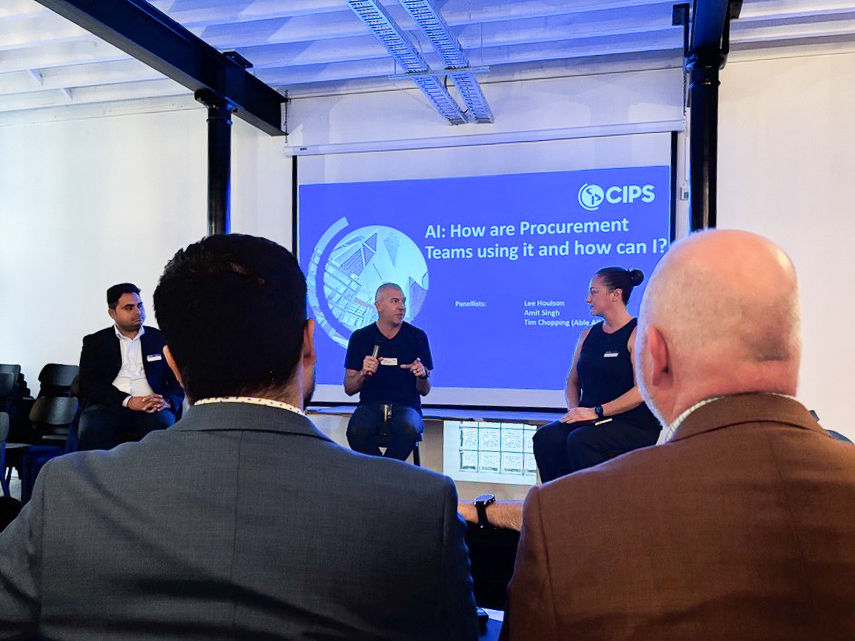Exploring AI in procurement: Insights from the South Australia CIPS panel discussion

In this blog post, Principal Adam Costantini highlights key points from the recent South Australia CIPS Panel Discussion. The discussions focused on how AI is transforming procurement processes and the ethical considerations involved. Adam also shares his insights on AI’s impact on the industry.
On Thursday, 20th March 2025, I had the opportunity to attend an event hosted by the Chartered Institute of Procurement and Supply (CIPS) SA Chapter in Adelaide. The evening featured a panel discussion on the topic of: ‘AI – How are Procurement teams using it, and how can I?’

The night began with a networking session, followed by a thought-provoking panel discussion with Tim Chopping (Able AI), Amit Singh (Adelaide University), and Lee Houlson (KBR), hosted by CIPS SA member, Shannon Bottrell. The panellists explored various aspects and perspectives of AI in procurement, covering topics such as:
- The evolution of AI and its current applications in procurement
- How AI can enhance the efficiency of procurement teams from both buyer and tenderer perspectives
- The potential for AI to replace procurement personnel
- Legal and ethical considerations associated with AI in procurement
Discussion highlights
The discussion highlighted several key points:
1. Ethical use of AI: The panel emphasised the importance of ensuring procurement organisations understand and consider ethical considerations in the use of AI for Procurement. AI must be used responsibly and transparency is crucial.
2. Benefits of AI in procurement:
For buyers: AI can serve as a non-biased first gate for mandatory assessments, making procurement processes more efficient and ensuring integrity is met. A few examples were explored where large companies missed tenders due to not meeting minimum standards as a result of AI screening, whereas there may have been a risk that a procurement team member may have passed it due to the reputation of a larger tenderer. It can also assist in black-and-white analysis, such as number crunching, while still requiring human oversight.
For sellers/suppliers: AI can streamline the process of producing and responding to bids. It can learn frameworks like the Commonwealth Procurement Rules and evaluation methodologies, review tenders and provide scores based on a set evaluation criteria. This can act as a virtual ‘red-team’ review without human bias or ‘group think’
3. Cautions around AI: The panel advised against relying solely on AI for writing bids but suggested using it to review bids against criteria to ensure they are addressed. They also stressed the importance of having frameworks and policies in place to protect sensitive information of both the supplier and purchaser. Ideally, each organisation should have a roadmap that describes how AI will be used (i.e. in what context, and for what purpose) and what information that it ‘needs to learn’ to be most effective within the ‘walls’ of the organisation.
Reflections from the session
In my view, AI is likely (in the short term) to improve efficiency and effectiveness of procurement teams, enabling people focus on more complex tasks such as maintaining productive relationships with their commercial counterparts, strategic thinking and complex program decision making. People (and relationships) are critical to the success of complex projects, and that is something that AI cannot replace easily.
Whilst the implementation of AI models can be exciting for our discipline, experienced procurement/commercial practitioners should maintain awareness of its impact on junior personnel who are learning. Build their practical skills and experience – ensure that practical experience can be obtained first, before using an AI model to replicate that task as current models can be prone to error.
Admittedly, I haven’t been an avid user of AI in the past, but have started to use it in an approved manner over the last month to assist with bid work (primarily research and searching our internal networks for information such as case studies and CVs). It has been a great support, and has increased my efficiency on Business Development and bidding work.
One of my MBA mentees probably put it best in that the best use of AI should not be a master/slave relationship – but rather a collaboration between human and AI to make things easier (allowing you to focus on the most important tasks).


